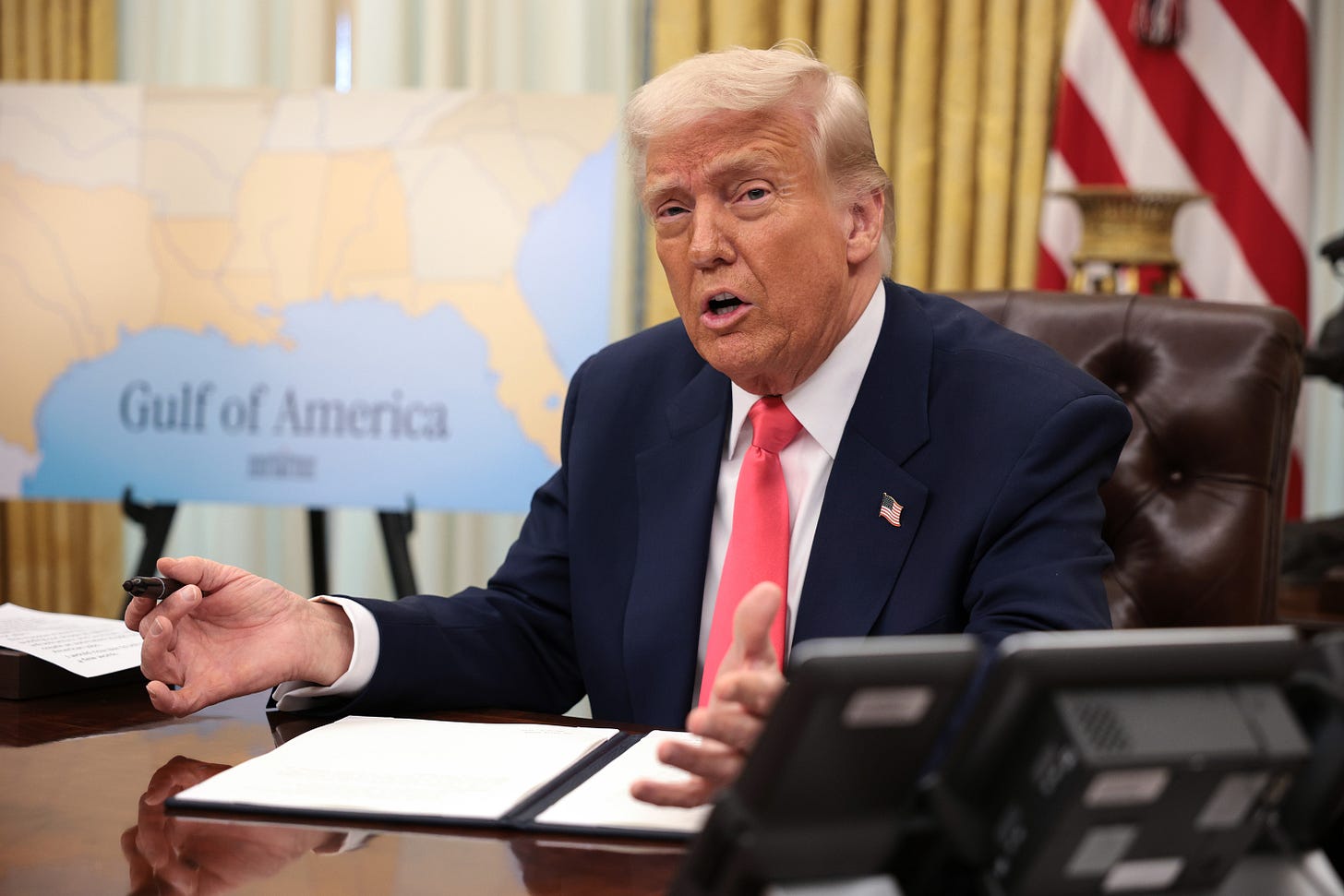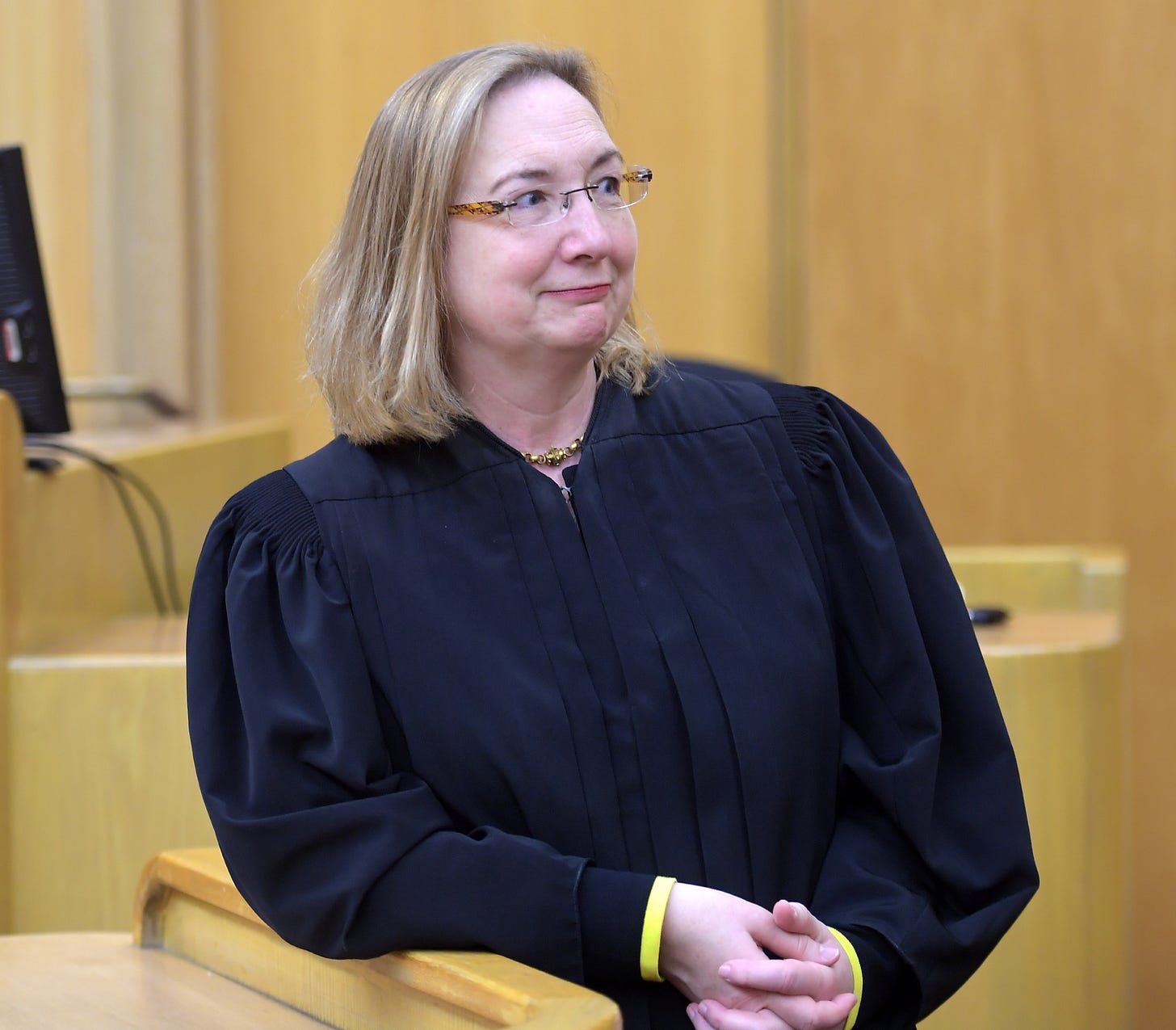Big Law's Triumph Over Trump
A federal judge eviscerates one of Trump's most alarming executive orders

In a cringe-worthy twist on the theatrical phrase “Let’s kill all the lawyers,” EO 14230 takes the approach of “Let’s kill the lawyers I don’t like,” sending the clear message: lawyers must stick to the party line, or else. — Judge Beryl A. Howell
The response from Big Law after Donald Trump started retaliating against firms he didn’t like will be remembered as one of the great character tests of American public life in 2025.
Paul Weiss has been justifiably condemned for its capitulation and cowardice. Perkins Coie should be equally celebrated for its firmness and courage.
And all attorneys owe a debt of gratitude to Judge Beryl A. Howell of the U.S. District Court for the District of Columbia.
On Friday, Howell declared Executive Order 14230, “Addressing Risks from Perkins Coie LLP,” which is one the most alarming abuses of state power wielded by Trump against private citizens, “unlawful” and “null and void” because “it violates the First, Fifth, and Sixth Amendments to the U.S. Constitution.” (I’m not a lawyer, but violating 30% of the Bill of Rights in one EO seems bad.)
Howell’s 102-page opinion is worth reading in full. It lays out in excruciating detail Howell’s view that the White House’s arguments for the EO were pathetic and Trump’s abuses of the Constitution were blatant.
Howell accuses Trump of “using the power of the presidency to target individual lawyers and law firms associated with them based on personal dislike of their legal work—in other words, for retribution.”
She says the EO “targeted [Perkins Coie] because the Firm expressed support for employment policies the President does not like, represented clients the President does not like, represented clients seeking litigation results the President does not like, and represented clients challenging some of the President’s actions, which he also does not like. That is unconstitutional retaliation and viewpoint discrimination, plain and simple.”
There is a lot of litigation against Trump to keep track of, and not every lawsuit is clear-cut. But the weaponization of EOs against law firms is unique. As Howell’s opinion makes clear, there was no policy or intellectual justification for it. It was, “plain and simple,” an abuse of power by the government against a perceived political enemy. Imagine what American politics would look like a decade from now if this kind of thing becomes the norm.
One bright spot in this saga is how isolated the White House was in its defense of this executive order, which you can glean from a footnote in Howell’s opinion summarizing the amicus briefs filed in the case.
Perkins Coie had the backing of twenty-two amici including “a wide range of interested lawyers and law firms; legal professional organizations; law professors; 346 former state and federal judges; former and current in-house general counsel; former senior government officials; media and press freedom organizations; and organizations including the ACLU, Cato Institute, Institute for Justice, Foundation for Individual Rights and Expression, and Reporters Committee for Freedom of the Press, among others.”
As for the Trump administration? “A single amicus brief was submitted,” the judge notes, “in support of the government by three gun rights groups and three conservative advocacy organizations.”
Howell was also unimpressed with the government’s lawyering in the case and is critical of it throughout. In one footnote, she notes, “This critique of plaintiff’s complaint is somewhat ironic given the government’s lack of clarity in identifying the specific grounds relied upon in seeking dismissal of the claims, compounded by the government’s failure to comply with applicable procedural rules in bringing a cross-motion for summary judgment.”
You can find Judge Howell’s opinion here. Below are some key excerpts from the opening and the conclusion with many citations omitted or shortened (emphasis mine):
No American President has ever before issued executive orders like the one at issue in this lawsuit targeting a prominent law firm with adverse actions to be executed by all Executive branch agencies but, in purpose and effect, this action draws from a playbook as old as Shakespeare, who penned the phrase: “The first thing we do, let’s kill all the lawyers.”
When Shakespeare’s character, a rebel leader intent on becoming king hears this suggestion, he promptly incorporates this tactic as part of his plan to assume power, leading in the same scene to the rebel leader demanding “[a]way with him,” referring to an educated clerk, who “can make obligations and write court hand.” Eliminating lawyers as the guardians of the rule of law removes a major impediment to the path to more power. See Walters v. Nat’l Ass’n of Radiation Survivors, 473 U.S. 305, 371 n.24 (1985) (Stevens, J., dissenting) (explaining the import of the same Shakespearean statement to be “that disposing of lawyers is a step in the direction of a totalitarian form of government”).
The importance of independent lawyers to ensuring the American judicial system’s fair and impartial administration of justice has been recognized in this country since its founding era. In 1770, John Adams made the singularly unpopular decision to represent eight British soldiers charged with murder for their roles in the Boston Massacre and “claimed later to have suffered the loss of more than half his practice. “I had no hesitation,” he explained, since “Council ought to be the very last thing that an accused Person should want in a free Country,” and “the Bar ought . . . to be independent and impartial at all Times And in every Circumstance.”
When the Bill of Rights was ratified, these principles were codified into the Constitution: The Sixth Amendment secured the right, in “all criminal prosecutions,” to “have the Assistance of Counsel for . . . defence,” and the Fifth Amendment protected “the right to the aid of counsel when desired and provided by the party asserting the right.” Powell v. Alabama. This value placed on the role of lawyers caught the attention of Alexis de Tocqueville, who in reflecting on his travels throughout the early United States in 1831 and 1832, insightfully remarked that “the authority . . . intrusted to members of the legal profession . . . is the most powerful existing security against the excesses of democracy.”
The Supreme Court, too, has recognized the importance of lawyers to the functioning of the American judicial system, since “[a]n informed, independent judiciary presumes an informed, independent bar.” This is so because Congress may legislate, the President may implement, and courts may adjudicate, “but only the lawyers can prepare and submit the great issues of human justice under law in such manner and form that courts, in the ultimate, may be effective.” Absent their crucial independence, lawyers would “become nothing more than parrots of the views of whatever group wields governmental power at the moment.” Cohen v. Hurley (1961) (Black, J., dissenting).
The instant case presents an unprecedented attack on these foundational principles. On March 6, 2025, President Trump issued Executive Order 14230 (“EO 14230”), 90 Fed. Reg. 11781 (Mar. 11, 2025), entitled “Addressing Risks from Perkins Coie LLP.” By its terms, this Order stigmatizes and penalizes a particular law firm and its employees—from its partners to its associate attorneys, secretaries, and mailroom attendants—due to the Firm’s representation, both in the past and currently, of clients pursuing claims and taking positions with which the current President disagrees, as well as the Firm’s own speech. In a cringe-worthy twist on the theatrical phrase “Let’s kill all the lawyers,” EO 14230 takes the approach of “Let’s kill the lawyers I don’t like,” sending the clear message: lawyers must stick to the party line, or else.
Using the powers of the federal government to target lawyers for their representation of clients and avowed progressive employment policies in an overt attempt to suppress and punish certain viewpoints, however, is contrary to the Constitution, which requires that the government respond to dissenting or unpopular speech or ideas with “tolerance, not coercion.” 303 Creative LLC v. Elenis. The Supreme Court has long made clear that “no official, high or petty, can prescribe what shall be orthodox in politics . . . or other matters of opinion.” W. Va. State Bd. of Educ. v. Barnette. Simply put, government officials “cannot . . . use the power of the State to punish or suppress disfavored expression.” NRA v. Vullo.
That, however, is exactly what is happening here. For this reason and those explained more fully below, Executive Order 14230 is unconstitutional, and the findings and instructions to Executive Branch agencies issued in its Sections 1 through 5 cannot be allowed to stand. …
The U.S. Constitution affords critical protections against Executive action like that ordered in EO 14230. Government officials, including the President, may not “subject[] individuals to ‘retaliatory actions’ after the fact for having engaged in protected speech.” Hous. Cmty. Coll. Sys., 595 U.S. at 474 (quoting Nieves, 587 U.S. at 398). They may neither “use the power of the State to punish or suppress disfavored expression,” Vullo, 602 U.S. at 188, nor engage in the use of “purely personal and arbitrary power,” Yick Wo, 118 U.S. at 370. In this case, these and other foundational protections were violated by EO 14230. On that basis, this Court has found that EO 14230 violates the Constitution and is thus null and void.






The gathered remarks of Howell paint a damning picture. I’ve no doubt Trump will appeal to the Supreme Court but can’t see ho they could make any other decision.
Ryan, thank you for writing this piece. You have made what this EO and the judge’s response in a clear way for people to understand. The importance of judges weighing in a forceful way upholding the rule of law and the reason for lawyers. I remember watching HBO special “John Adams” when he defended the British soldiers as the reason for it. This goes back to the founders of our country respect for the rule of law and lawyers to defend it. I appreciate Judge Howell delivering her opinion with such forcefulness this is the core of our country upholding law & order in this country and all the parts needed to uphold it is judges & lawyers equally. No one person should be able to challenge that for revenge or disapproval her stating that was very important !